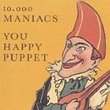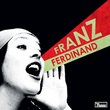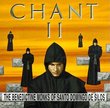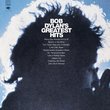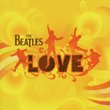| All Artists: Susan Mckeown, Chanting House Title: Prophecy Members Wishing: 3 Total Copies: 0 Original Release Date: 3/4/2002 Release Date: 3/4/2002 Album Type: Import Genre: International Music Style: Celtic Number of Discs: 1 SwapaCD Credits: 1 UPC: 708434070421 |
Search - Susan Mckeown, Chanting House :: Prophecy
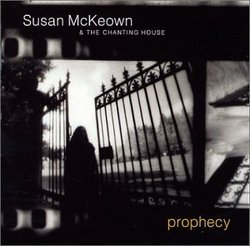 | Susan Mckeown, Chanting House Prophecy Genre: International Music
The follow-up to their debut 'Bones' (SNG/Prime 1995), 'Prophecy' is "a record of many brilliant moods" (puremusic.com) from Susan McKeown & The Chanting House. Progressive, hard-edged folk-rock, 'Prophecy' "packs a se... more » |
Larger Image |
CD DetailsSynopsis
Album Description The follow-up to their debut 'Bones' (SNG/Prime 1995), 'Prophecy' is "a record of many brilliant moods" (puremusic.com) from Susan McKeown & The Chanting House. Progressive, hard-edged folk-rock, 'Prophecy' "packs a serious belly-punch to complacency and indifference, and adds further ammunition to her reputation as an uncompromising writer and singer." (Irish Times) 'Be Brave, Love, Be Strong' leads off the album with Susan's defiant , soaring vocals before a metaphor of hope is invoked on 'River', "as poetic a plea for peace in Ireland as the world could wish" (Willamette Week). Natalie Merchant joins Susan in the incantation of the names of Ireland's rivers on this song, and in a duet on 'Because I could not stop for Death', the haunting Emily Dickinson poem set to music by McKeown. "'Chances Are' is as fine a capturing of the brittleness of relationships as you'll encounter" (Irish Times). 'Seven Cold Glories' is inspired by poems by Yeats and Eva Gore-Booth, and dedicated to the memory of Ann Lovett, the fifteen-year-old schoolgirl who died alone in childbirth at the foot of a statue of the Virgin Mary in an Irish churchyard in 1994. Also on the album, 'Prophecy'. "The lush title track, with its nostalgic feel and dissonant carnival organ backing, is a gem." (Hot Press, Ireland) Co-written with bandmate and co-producer Jon Spurney, the song was inspired by a tale of the dark Irish fairy Otherworld: McKeown saw it as eerily appropriate for New York City. "And we must weep and we must sing/And keep the little flame flickering." Throughout, Susan is accompanied by Spurney and longtime Chanting House members Lindsey Horner , Michelle Kinney and Joe Trump, as well as Jeff Allen, Allison Miller and Catherine Bent. Guests on the album include: Natalie Merchant, Johnny Cunningham, Gerry Leonard and Russ Johnson Similarly Requested CDs
|
CD ReviewsGreat mix of folk, rock, blues, jazz with Irish stylings Daniel J. Hamlow | Narita, Japan | 01/26/2004 (5 out of 5 stars) "On 24 January, I attended a double-bill concert at San Juan College's Henderson Fine Arts Center. The first act was the Celtic flute group Flook. The second part of this concert was by Susan McKeown and the Chanting House, consisting of her guitarist and bassist. Most of the songs were taken from her 2002 album Prophecy. The flyer was quick and right to point out the fallacy of pigeonholing her in the Celtic category, as she incorporates folk, rock, jazz, and blues in her music. There are multiple themes of faith, wished-for-peace, wished-for-fulfillment, all with a background of Irish culture.Songs of searching for faith or regaining faith embody two songs. "Be Brave, Love Be Strong" sports a folky guitar and some trumpets, and in this case, celebrates the gaining of previously lost faith. Seeking to understand and reconcile one's pain with some faraway god is key to "Seven Cold Glories."The melodic and upbeat "River" was performed at the concert. ANd here, one can not only hear ex-10,000 Maniac Natalie Merchant singing with her, but the names of Irish rivers. The river here is symbolized as a healing power from the effects of war. Given Ireland's history of war, first against Britain and then between North and South, this song is apropos. "Bind us in friendship so rage will never rise again" applies not only to Ireland but elsewhere as well.Introspective songs like "Chances Are" are with some jazz inflections what with the piano, bass, and trumpet. The pain elicited by memories and hindsight is given with "I dream an old woman's dreams, filled with memories and might-have-beens."The verses of "Wheels Of The World" sport a cello and a quiet atmosphere before the band comes into full bloom in the chorus. This is another testament to Irish history.The bluesy rock of "What Did I Ever Do To You" was also performed at the concert.How's this? An Emily Dickinson poem set to reflective music, made so with the cello? That's what McKeown does for "Because I Could Not Stop For Death" on the voyage the protagonist takes in Death's carriage, looking at the scenery that the dead one will never again see. Natalie Merchant sings the last two verses in this song. The two sing together in the reprise of the first stanza.The heavy electric sound mixed with Celtic dominates "Ballinaboula" based on an engraving and Irish folktales of a sorcerer coming to take a girl with him. A similar sound is done on "South", which was also performed at the concert.The title track, a minimalist number featuring a mellotron, optigan, and celeste, is based on observations by poet William Butler Yeats on a lament of the passing of the Golden Age. Indeed, in 1893, when Yeats wrote this, the world was entering the age of modernity, shucking off Victorian values that had been challenged by Darwin and applied in all walks of life. A world that had once thought to have been perfect had been sundered, for better or worse.McKeown's voice recalls Chrissie Hynde and a more restrained Laura Branigan, but her music is a richer and more diverse mix, with an honesty and deeper feeling. Prophecy proves McKeown to be a good artist on CD as well as live."
|

 Track Listings (10) - Disc #1
Track Listings (10) - Disc #1